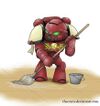Magic
>
If you're looking for the card game, check Magic: The Gathering
Magic
Magic is a term that encompasses mystical energies inherent in many game worlds. These allow a person who learns how to use this energy to create fantastic, supernatural effects.
Magic functions differently in many game systems, but almost all of them call upon some innate essence of the world or person.
Magic is most often formed into repeatable functions called Spells. Said spells perform many functions, from elemental damage in combat, healing wounds or fixing things, and making spectacular illusions.
Magic in most game systems is an extremely complicated thing, requiring much study and thought to use effectively.
Magic is spelled magick if you are a homo.
Magic in 3.5e
Magic in Dungeons and Dragons 3.5e is called the art by elves and other such nonsense by other such nonsensical creatures. It is similar to the weeaboo idea of chi/ki where magic is all around us like the force from Star Wars, like the holy gandalf in religion and the.... yeah you get the picture. Magic in 3.5e is everywhere like paedobear.
To cast spells you first need to know the spell (if it is an arcane spell) which makes sense - you can't differentiate and integral if you don't haz mathz. Divine spell casters have it easy though, their god/diety/imaginary friend lets them cast any spell if they have enough levels and if they ask really nicely in the morning.
Casting the spell takes "lots" of effort (seriously, magic users in D&D are physically weak) so they can only cast a certain number of spells from a certain casting difficulty per day.
Magic in 4e
In 4E, familiar spells from prior editions still exist, though many of them have disappeared. All in all, the spell selection is significantly smaller in 4E, with many spells (specifically exceedingly minor or extreme ones, like various cantrips and Wish/Prismatic Wall). In deed, in 4E, spells are less intricate and specific, and more straight-forward. This isn't to say that 4E is without familiar spells like Prestidigitation or non-combat spells like their utility spell for summoning up a mansion.
Another notable point in 4E magic is the fact that classes don't generally share spell lists anymore. For example, the Wizard and Sorcerer have wholly different selections of spells and class features. Spells in 4E are classified with powers, meaning a spellcaster is going to generally have about as many spells as a Fighter has special attacks, stances, and disciplines. They're also functionally similar, differing only in affect, but not in the usage of attack rolls to resolve the success of the spell. This has led to the prevalent criticism that "all classes in 4E are spellcasters," and the nickname "caster edition."
There's also rituals, which are more powerful magic that takes a while. They generally have advanced, out of-combat purposes and unlike most of the typical combat spells like those mentioned above, cost money for components and the like.
Magic The Warp in Dark Heresy
Unlike in 3.5e, where everything's colourful and cheery, trying to use ethereal powers in the 40,000 universe could get your "beautiful snowflake" soul stolen by nasty deamons you will then rape the shit out of your body and then defecate your eyeballs.
On the plus side, Psykers (as magic users are called) know very few powers (two at the start) in the game but can cast them whenever they want as long as they don't fail the casting roll.
